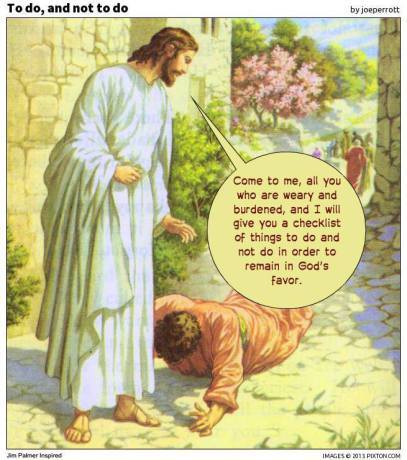Why are we so easily offended?
The stereotype used to be that liberals were the ones easily offended by everything, and were politically correct to a fault. But lately it seems the tables are turning. In my world, both online and off, it is the conservatives who are the easily offended and make mountains out of tiny mustard seeds when there’s absolutely no need for it.
I ask myself often, Is this really what Christianity is all about, or is this just the Christian-tainted culture water in which I swim? I can’t imagine the early Christians bickering about the context of curse words or satirical Facebook memes when persecution and death were so imminent. At some point in evangelical history, aversion or disagreement on faith-related issues became perceived as a threat. For many people, the best way to protect their faith from crumbling like a house of cards is to surround themselves with like-minded people who never challenge their ideals. For many, it’s a virtuous act to avoid the world beyond their bubble.
#NotAllChristians
I wish I didn’t have to keep repeating “This message does not apply to all Christians,” but inevitably, someone will feel compelled to point out that #NotAllChristians act this way. And that helps proves my point: there are enough Christians in the fold to whom the criticism applies. If you feel offended, perhaps that’s a hint to examine your own heart. Why is it so hard for us to own up to our collective mistakes? Why is it so hard to acknowledge that we do have quite a few people in our midst who do the exact opposite of everything Jesus said to do, and call out hypocrisy for what it is?
A meme like this, for example, is not an indictment of everyone who attends a megachurch (there’s nothing wrong with that) but rather a call to keep our priorities in order (source):

Shortly after one of my seminary friends shared this on Facebook, the comment thread blew up with responses from other Christians about how offensive it was, that clearly my Christian friend had never been to their megachurch, etc. In other words, they completely missed the point. There should be “mega homeless shelters,” but in the midst of arguing the merits of megachurches and the people who attend them, the homeless people in question were completely forgotten.
Another Christian friend shared this recently (source):

It’s possible that the outcry from this one comes from an inability to distinguish satire on the internet, which is why I firmly believe that Facebook should invest in a sarcasm font over another ‘like’ button. Satire, as you may know, is intended to point out a problem – in this case, an ethical problem – using humor. We know there are Christians who act like this. They’re the kind who want drug tests administered before families can go on welfare when Jesus did no such thing (or whatever a first-century equivalent might be). They want the “good” families, with both a mother and a father, who are married, to receive benefits, and to hell with everyone else. If you are straight, part of a traditional nuclear family, and vote a certain way, you gain all the Jesus Points.
What both amuses and saddens me is that the Christians who were so offended by this meme were acting just like the Pharisees that Jesus was trying to reach. People always ask me what it is about Christianity that appealed to me as a Jew, and one item on that list is just how much of a mensch Jesus was. He acted boldly and used strong words when necessary, knowing he would royally piss people off. His methods – flipping over tables, responding to questions with more questions – might be considered flippant and even rude by our standards. Read in the context of his time, Jesus’ actions were appalling, depending on which social class you belonged to.
Through a glass darkly
Here’s the thing: sometimes, harsh words (or memes in this case) are necessary to get a point across. My theory is that those who are most offended might be the ones for whom the meme was intended. I strongly encourage you to ask yourself why it is you might be offended. Does it upset you when Christians as a whole are portrayed negatively? Or are you embarrassed at being called out for behavior that you are guilty of practicing?
If it’s the former, that’s understandable. No one likes to be insulted, especially when you know yourself well enough to know you don’t personally deserve it. It’s important to keep in mind, though, that one denomination’s truth is another denomination’s heresy. Today we’re ashamed of the Christians who condoned slavery, but they were utterly convinced they were doing God’s work – and the abolitionists were the sinful ones.
Christians have hurt people. Christians have been wrong about a number of things. Those are facts, and it’s a mark of maturity to be able to own it.
Shaking off the dust
Growing up Jewish, I was misunderstood quite a bit, so much that I eventually got used to being asked if Moses was the “Jewish Jesus” and if Jews had a Santa Claus equivalent. Those questions (let’s admit, they’re pretty dumb) didn’t exactly stop in elementary school. They were asked of me in college as well. But putting up with that ignorance gave me a priceless gift: thick skin.
You know what’s funny? When I became a Christian, I thought it was required to be insulted at every anti-Christian remark, because Jesus warned that his disciples should expect persecution. I wrote what is now a pretty embarrassing editorial for my school paper – and sadly, one that got some of the most page views online – about how an ad in the student center from the Freethinkers club, “Smile, there probably isn’t a god,” was bonafide Christian persecution on campus. The nonreligious students bashed it to pieces on the web while my inbox overflowed with messages from Christian students and faculty alike, praising me for my bravery. It was all so bewildering. Today, though I still admire College Sarahbeth’s pluck, I’d want to smack her upside the head for being so naïve.
Over the years, I’ve developed a sense of self-awareness. It’s easier now than it used to be to admit when I’m wrong or guilty of something (though it does kinda depend on what it is I’m wrong or guilty about!). When I see memes like the ones above on Facebook, I know they have nothing to do with me. When I read blog posts by friends of mine who call themselves anti-theists, I’m not offended because I know that religion can hurt, and I know what they’ve been through. Venting can be a critical part of healing.
Today, I have my own faith and don’t feel a need to defend it. I’m aware of what my flaws are, for the most part, and what I need to work on. For all the talk about Christ dwelling in us, Christians are still people, which shouldn’t be difficult to understand. We can love our family members even if we occasionally have to apologize for the things they say or do in public.
Like this post? Check out Confessions of a Jew-ish Skeptic, now available on Amazon.
Stay in touch via Facebook and Twitter.
Filed under: Social Issues, Uncategorized Tagged: Christian culture, Christianity, Controversy, evangelicals, Facebook, Judaism, Seminary, social justice, Spiritual Abuse











